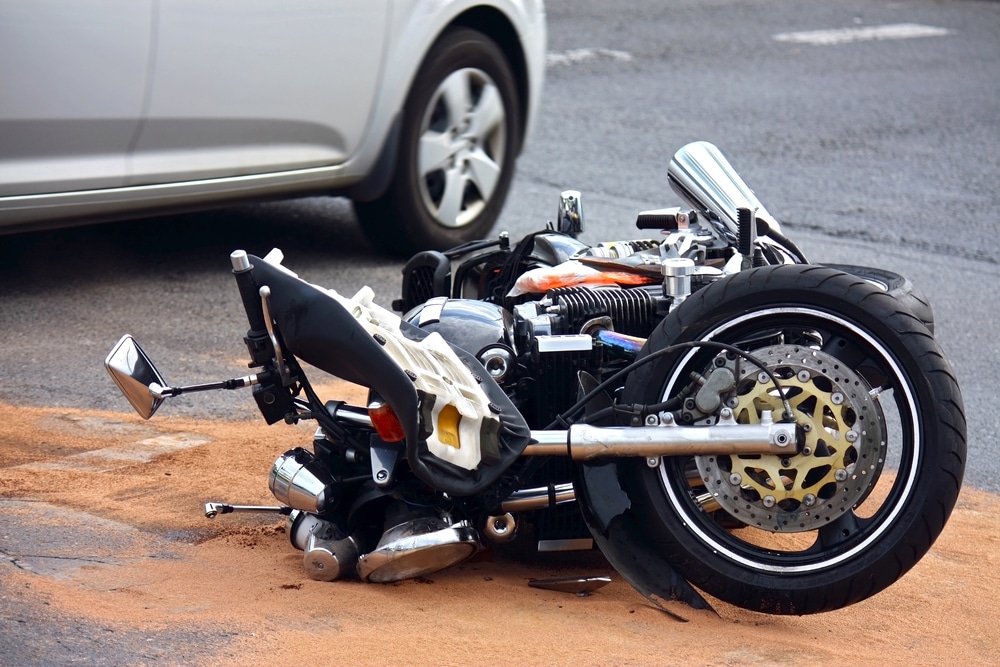Steps To Take Before and After a Motorcycle Accident in Maryland

Most motorcycle riders in Maryland don’t expect to get in a crash, but accidents happen fast and can leave you with serious injuries and costly damage.
While you can’t control what other drivers do, you can take steps to protect yourself. The right insurance, solid gear, and knowing what to do afterward can make a major difference. These choices won’t stop an accident, but they can help you stay in control when it matters most.
Steps To Take Before You Get in an Accident
Don’t Waive Your PIP Insurance Coverage
Riding a motorcycle in Maryland comes with responsibilities—starting with the legal requirement to carry insurance. All motorcycles in the state must be registered and insured with minimum liability limits of $30,000 for injury to one person, $60,000 for two or more people, and $15,000 for property damage. These rules apply to any motorcycle with an engine over 70 ccs that can go over 35 mph.
But while liability coverage is mandatory, one of the most important forms of protection—Personal Injury Protection (PIP) or Medical Payments coverage—is optional. And too many riders don’t purchase the optional coverage.
What Is Medical Payment coverage and Why Does It Matter?
Medical Payments coverage pays for your medical bills and lost income after a crash, no matter who was at fault. It’s a fast, no-hassle way to get financial help while you’re waiting on a claim or lawsuit. You don’t have to meet a deductible, and coverage kicks in right away.
Why People Waive It—and Why You Shouldn’t
Some riders waive PIP or Medical Payments coverage to save money, assuming their health insurance will cover them. But health plans usually require deductibles and can seek reimbursement from your settlement later. Others assume they won’t need it—or that liability coverage is enough. In reality, PIP helps cover out-of-pocket costs quickly while you’re recovering.
The Cost of Skipping Coverage
Maryland’s base PIP and Medical Payments coverage is $2,500, and the yearly premium for motorcylists is usually around $100. You can double that protection for a slightly higher rate. It’s affordable and covers not just you, but also passengers and even pedestrians. You’re also allowed up to one year from the crash to use the benefits, which helps with delayed injuries.
In short, waiving PIP or Medical Payments coverage may save you a few bucks upfront—but if you’re ever hurt, it could cost you much more.
Make Sure You Have Medical Insurance
When you’re hurt in a motorcycle crash, medical care is the first and most important cost you’ll face. Having active health insurance makes the difference between getting treatment or struggling to cover rising hospital bills on your own. Here’s what your policy can do—and what it won’t—after an accident.
Health Insurance Basics
Health insurance helps pay for your care after an injury. You’ll still owe deductibles and monthly premiums, but coverage typically includes hospital visits, emergency treatment, diagnostic tests, and follow-ups. Without it, a serious injury can quickly lead to overwhelming debt, even if the crash wasn’t your fault. Medical coverage isn’t optional—it’s essential protection.
What Health Insurance Doesn’t Cover
Medical insurance only pays for the treatment itself. It won’t reimburse you for missed time at work, repairs to your motorcycle, or emotional and physical pain you go through in recovery. These other losses add up fast, especially after a serious accident. To get those costs covered, you’ll need to pursue a personal injury claim.
Medicaid in Maryland
Medicaid is the best option available for low-income residents in Maryland. It pays for doctor visits, hospital stays, emergency care, surgeries, and long-term treatment related to crash injuries.
To qualify, you must meet income and household guidelines. In many cases, Medicaid is the only reason injured riders can get proper care without going into debt. It’s a vital safety net for those who can’t afford private insurance.
Medicaid Liens and Recovery
If Medicaid covers your treatment, it will place a lien on your injury claim. This means a portion of your settlement must go back to Medicaid to repay what it spent. Your lawyer is legally required to pay that lien from your recovery, and the amount usually follows a fixed formula. It’s not something you can negotiate much, and if it’s overlooked, it could cost you your benefits. That’s why it’s critical to factor Medicaid liens into any settlement talks.
Alternatives Through Maryland Health Connection
If you don’t qualify for Medicaid, the Maryland Health Connection offers another option. It’s the state-run marketplace where you can compare insurance plans, apply for subsidies, and find coverage that fits your income. Enrollment opens during set periods, but certain events—like an accident—trigger special enrollment rights. Getting coverage fast ensures you can pay medical bills while protecting your long-term health and finances.
Why You Should Talk to a Lawyer Before Settling
Even with health insurance, injury claims are complex. Medicaid, private insurers, and hospitals may all seek repayment out of your settlement. If you accept a payout without understanding how liens work or what expenses must be covered, you could lose more than you think. Experienced Towson motorcycle accident attorney John Leppler can walk you through every detail—from calculating medical liens to preserving your Medicaid eligibility.
Attorney John Leppler knows how to coordinate with Medicaid and insurers so your rights are protected. This guidance is especially important if you’re depending on Medicaid for ongoing care. With the right legal help, you won’t leave money on the table or risk losing vital benefits after your accident.
Insure Your Motorcycle
Motorcycle insurance in Maryland isn’t just about following the law—it’s about protecting your ride and your finances. After a crash, most bikes don’t make it out in one piece, and without the right coverage, you could be left with nothing. Here’s why insuring your motorcycle properly makes a real difference.
Why Motorcycle Insurance Matters
After a serious crash, most motorcycles are left in pieces—and in many cases, they’re totaled beyond repair. Because of how bikes are built and how much damage they take in an impact, this outcome is common. If you don’t have insurance, you won’t recover anything for the bike itself, which means you’re paying out of pocket for something that’s already gone, all while dealing with medical bills and time off work.
Comprehensive and Collision Coverage
Liability insurance only covers damage you cause to others; it doesn’t cover your motorcycle. To protect your own bike, you need comprehensive and collision coverage. These are optional if your motorcycle is paid off, but they’re required if you’re leasing or financing. Still, even if you’ve paid in full, adding both types of coverage gives you real protection when the unexpected happens.
What These Coverages Include
Comprehensive coverage applies to events outside your control, such as:
- Theft
- Fire
- Vandalism
- Weather damage
- Hitting an animal
Collision coverage, on the other hand, pays for damage when your bike collides with another vehicle or object—regardless of who was at fault. Together, these coverages give you a way to recover money after a crash, instead of being stuck with the full loss.
Protecting Your Investment
Motorcycles aren’t cheap, and if you’ve put time or money into yours, losing it suddenly can hit hard. Without the right coverage, replacing your bike may not be financially possible. That’s why having both comprehensive and collision coverage matters—it gives you a path to recovery if your bike is damaged beyond repair.
Don’t Wait Until It’s Too Late
Insurance only works if you have it in place before the accident. Once your bike is wrecked, you can’t go back and add coverage. If you ride often or own a newer model, it’s worth making sure your insurance protects more than just others—it should protect your motorcycle too.
Steps To Take After a Motorcycle Accident
Get Medical Treatment
Getting medical help after a motorcycle crash isn’t just about your health—it’s one of the most important steps for protecting your legal case. Delays, missed appointments, or even innocent mistakes can give insurance companies an excuse to reduce or deny your claim. Here’s what you need to know:
Don’t Wait to Get Checked Out
It’s common to say “I feel fine” after a crash, but that’s a mistake. Your body releases adrenaline and endorphins during trauma, which can block pain for hours or even days. Some injuries—like internal bleeding, concussions, or spinal damage—might not show symptoms right away.
If you skip that first trip to the hospital, you risk missing a diagnosis and weakening your case. In Baltimore, hospitals like Johns Hopkins and the University of Maryland Medical Center specialize in trauma care. Going in right away creates a medical record that links your injuries directly to the crash.
Follow Your Doctor’s Instructions
Starting treatment is important, but sticking with it matters just as much. Insurance adjusters read your medical records line by line. They look for gaps in care or missed appointments as a way to argue that your injuries aren’t serious or weren’t caused by the accident. To protect yourself:
- Keep every follow-up appointment
- Complete all prescribed physical therapy
- Fill your medications and take them as directed
- Don’t stop treatment early unless your doctor signs off
These steps show you’re taking your recovery seriously and make it harder for insurers to poke holes in your claim.
Be Careful What You Post Online
Insurance companies keep an eye on social media. Even a photo of you walking your dog or out with friends can be twisted to suggest you’re not really hurt. During recovery, it’s smart to:
- Set your profiles to private
- Stay off social media as much as possible
- Never post about the accident or your injuries
Taking control of your medical care—and what the public sees—protects both your health and your case.
Schedule a Consult With Baltimore Motorcycle Accident Lawyer John Leppler Today
If you’ve been hurt in a motorcycle accident, Baltimore motorcycle attorney John Leppler of Leppler Injury Law can help you take the right next steps. He’ll work to protect your rights, deal with the insurance companies, and help you pursue full compensation. You don’t have to handle this alone. Contact us today to schedule a free consultation and get answers to your questions.
Some of the locations that attorney John Leppler serves includes Baltimore, Glen Burnie, Towson, Timonium, Pikesville, Owings Mills, Parkville, and more.
Related Articles
Is lane-splitting legal in Maryland?






